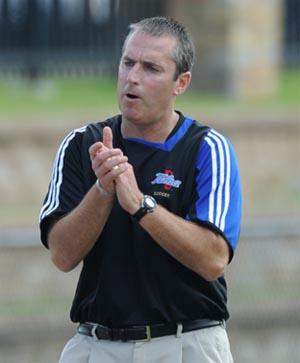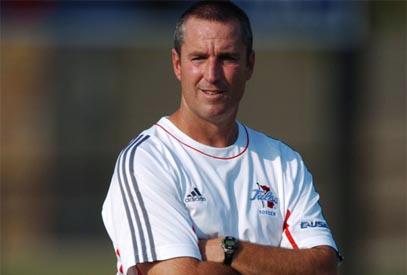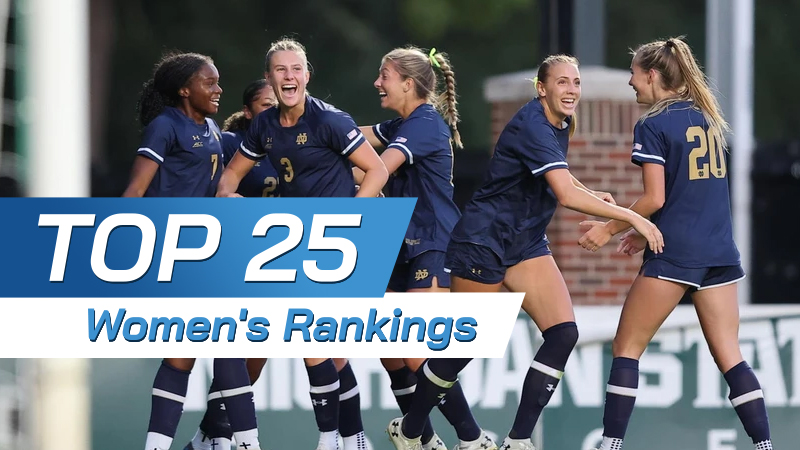 Tom McIntosh
Tom McIntoshTom McIntosh creates a jewel in Tulsa

March 15, 2009
There are people in various communities around the country who become synonymous with the game of soccer. University of Tulsa Men’s Soccer coach Tom McIntosh is just such a person in his hometown.
Having played there and now been a head coach for 14 years, McIntosh knows Tulsa soccer like the back of his hand, and he utilizes this as a strength in sustaining the successful Golden Hurricane program.
McIntosh knows a lot of people in other parts of the country don’t know what a strong soccer community Tulsa is, but it ends up being an impressive part of the recruiting sell when people visit.
“We still get a little bit of ‘Tulsa, is that a DI program?’ from people in other parts of the country who are not sure what Oklahoma looks like,” McIntosh said. “But once they get here, people start to understand. Our campus has gone through a major transformation and our soccer facilities are remarkable. We had a recruit up from Dallas a couple of weeks ago and his mom said ‘This place is like a hidden jewel. I wouldn’t have expected it.’”
 Tom McIntoshOf course prospective players and their families might do well to look at recent NCAA Tournament history, where the Golden Hurricane have been a fixture, including a quarterfinal appearance in 2004. The program has produced players for the professional ranks as well.
Tom McIntoshOf course prospective players and their families might do well to look at recent NCAA Tournament history, where the Golden Hurricane have been a fixture, including a quarterfinal appearance in 2004. The program has produced players for the professional ranks as well.
McIntosh said the legacy of the Tulsa Roughnecks from the old North American Soccer League is a major reason for the city’s strong soccer support. He was one of those in the stands watching as a teenager.
“That’s when it really exploded. Before that there was virtually none, but a lot of those players stayed and it jumpstarted youth soccer in the city,” he said. “That helped the competitive aspect of the game here. The talent level is good here in the city. The market size is not as big as Dallas or St. Louis but there have always been good players. Even looking at last year’s recruiting class, there are three kids from Oklahoma who started a lot of games for us and they were massive contributors. They were not really recruited by anyone else so you see how it has been an important part of our success.”
McIntosh said the team is still actively scouting major recruiting showcases around the country, and has developed something of a pipeline from the Dallas area, and perhaps surprisingly, from Southern California.
“People say, How do you get those kids from California to go to Oklahoma?' But the reality is there are not that many D1 programs so a lot of the good players have to fly to somewhere,” he said. “Why not here?”
McIntosh added that when the players actually get to Tulsa, the community support becomes even more endearing.
“It is attractive to people once they are here,” he said. “We’re fortunate in one respect, my whole team lives on campus in campus housing. We have a small campus (the school has the smallest enrollment of Football Division I-A programs), so chemistry is a big part of our success. We make sure everyone takes the time to understand their roles. Not everyone is going to play, but we still have 25 guys on the team.”
McIntosh’s devotion to playing an attractive, possession-oriented style of soccer is something of an endangered species in college soccer, but he notes that this puts an even greater importance on the concept of team chemistry.
“We are very much a team that emphasizes combination play, from our backs all the way through the front,” he said. “Guys understand they have to be good in possession and pull their weight from that standpoint, and that means they have to work well together.
“The movement (in college soccer) has been away from it but that’s just how I grew up. That’s how I watched the game, and that’s how I believe soccer should be played,” he continued. “I’m fortunate enough to have been around some coaches like Keith Eddy (former England international, captain of NASL superclub Cosmos and now the coaching director at Tulsa SC) who have really shaped me. It can be difficult to keep playing that way. Sometimes we get players even off of really successful club teams who just can’t adapt. In the same way, I may not be able to get the athletes that some of the top programs are able to get, but if I can get someone who is comfortable in possession and understands that style of play, sometimes we can get a leg up on other people.”
McIntosh is a big believer that player development doesn’t have to stop when players enter college.
“Our whole philosophy is developmental. We want players to improve their technique while they are here,” he said. “I think players at this age should continually be trying to improve their ability to receive the ball under pressure and to play. Maybe sometimes I emphasize that to a fault, but that’s how I would want to play. Colin Clark, my assistant, is really insightful from that side of the game. His whole philosophy is developmental too and he’s helped us do more.”
McIntosh also credited graduate assistant Justin Cook and volunteer goalkeeper coach Chris Mansfield with being important arms of the program.
Further cementing the head coach’s reputation in the town is the successful Mac’s Soccer Shack Retail store which he has operated with his brother Mark for several years, and of course the successful camp business, Mac’s National Soccer School.
Having played there and now been a head coach for 14 years, McIntosh knows Tulsa soccer like the back of his hand, and he utilizes this as a strength in sustaining the successful Golden Hurricane program.
McIntosh knows a lot of people in other parts of the country don’t know what a strong soccer community Tulsa is, but it ends up being an impressive part of the recruiting sell when people visit.
“We still get a little bit of ‘Tulsa, is that a DI program?’ from people in other parts of the country who are not sure what Oklahoma looks like,” McIntosh said. “But once they get here, people start to understand. Our campus has gone through a major transformation and our soccer facilities are remarkable. We had a recruit up from Dallas a couple of weeks ago and his mom said ‘This place is like a hidden jewel. I wouldn’t have expected it.’”
 Tom McIntosh
Tom McIntoshMcIntosh said the legacy of the Tulsa Roughnecks from the old North American Soccer League is a major reason for the city’s strong soccer support. He was one of those in the stands watching as a teenager.
“That’s when it really exploded. Before that there was virtually none, but a lot of those players stayed and it jumpstarted youth soccer in the city,” he said. “That helped the competitive aspect of the game here. The talent level is good here in the city. The market size is not as big as Dallas or St. Louis but there have always been good players. Even looking at last year’s recruiting class, there are three kids from Oklahoma who started a lot of games for us and they were massive contributors. They were not really recruited by anyone else so you see how it has been an important part of our success.”
McIntosh said the team is still actively scouting major recruiting showcases around the country, and has developed something of a pipeline from the Dallas area, and perhaps surprisingly, from Southern California.
“People say, How do you get those kids from California to go to Oklahoma?' But the reality is there are not that many D1 programs so a lot of the good players have to fly to somewhere,” he said. “Why not here?”
McIntosh added that when the players actually get to Tulsa, the community support becomes even more endearing.
“It is attractive to people once they are here,” he said. “We’re fortunate in one respect, my whole team lives on campus in campus housing. We have a small campus (the school has the smallest enrollment of Football Division I-A programs), so chemistry is a big part of our success. We make sure everyone takes the time to understand their roles. Not everyone is going to play, but we still have 25 guys on the team.”
McIntosh’s devotion to playing an attractive, possession-oriented style of soccer is something of an endangered species in college soccer, but he notes that this puts an even greater importance on the concept of team chemistry.
“We are very much a team that emphasizes combination play, from our backs all the way through the front,” he said. “Guys understand they have to be good in possession and pull their weight from that standpoint, and that means they have to work well together.
“The movement (in college soccer) has been away from it but that’s just how I grew up. That’s how I watched the game, and that’s how I believe soccer should be played,” he continued. “I’m fortunate enough to have been around some coaches like Keith Eddy (former England international, captain of NASL superclub Cosmos and now the coaching director at Tulsa SC) who have really shaped me. It can be difficult to keep playing that way. Sometimes we get players even off of really successful club teams who just can’t adapt. In the same way, I may not be able to get the athletes that some of the top programs are able to get, but if I can get someone who is comfortable in possession and understands that style of play, sometimes we can get a leg up on other people.”
McIntosh is a big believer that player development doesn’t have to stop when players enter college.
“Our whole philosophy is developmental. We want players to improve their technique while they are here,” he said. “I think players at this age should continually be trying to improve their ability to receive the ball under pressure and to play. Maybe sometimes I emphasize that to a fault, but that’s how I would want to play. Colin Clark, my assistant, is really insightful from that side of the game. His whole philosophy is developmental too and he’s helped us do more.”
McIntosh also credited graduate assistant Justin Cook and volunteer goalkeeper coach Chris Mansfield with being important arms of the program.
Further cementing the head coach’s reputation in the town is the successful Mac’s Soccer Shack Retail store which he has operated with his brother Mark for several years, and of course the successful camp business, Mac’s National Soccer School.
Headlines
- Recruiting Roundup: September 1-7
- How Do I Get Scouted by TopDrawerSoccer?
- Tigers Take Over Men's Division I Top 25
- IMG Academy Player Rankings: Boys 2026
-
Commitments: Staying in California

- ACC Squad New No. 1 in Women's Top 25
-
Women’s D2, D3, and NAIA Weekly Recap

-
Midwest High School Roundup - Sep.

-
Men’s D2, D3 & NAIA Weekly Recap

- TopDrawerSoccer TeamRank Update - Girls
IMG Academy Top 200/150 Rankings



